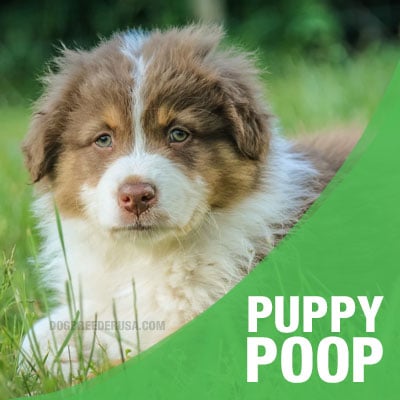How Often Should A Puppy Poop In A Day?
Does your puppy poop a lot each day? This may be perfectly normal, but they may have an issue that would need them to see your vet. Some dogs will only poop once a day, but other dogs will poop many times each day. Monitoring your dog, you will learn their bathroom habits and will know if this is normal or not.
How often should a puppy poop each day?

Most puppies will be very consistent with their bathroom habits, sometimes even down to around the same time each day. This is why your vet recommends keeping your puppy on a set schedule of feeding, sleeping, and bathroom breaks each day. How often your puppy will want to poop each day will depend on the age of your puppy. These are some common frequencies you should see based on your puppy’s age.
Puppies under a year
Most puppies under 6 months of age will want to go out to poop about 5 times a day. This consistency is good to show that their intestines are moving and functioning properly. If your puppy is not pooping often, they can quickly become constipated and have many other issues that they will have to deal with.
Adult Dogs
Once your puppy becomes an adult, they will drastically reduce the amount of times that they poop to only once or twice a day. Many of these dogs have set bathroom routines and may only want to go outside to potty a few times each day.
How to Tell If Your Puppy’s Poop Is Normal
When your puppy goes to use the bathroom, you need to inspect their poop each time. The health of your puppy can usually be told based on their bathroom habits. When watching your dog, these are some things that you need to monitor your puppy’s stool for:
- Color: Your puppy’s stool should be a brown color. Things such as red, yellow, or green could mean that there is something wrong. Sometimes this color change is due to what they ate. If your puppy’s dog food has different colored pieces, this can also turn their poop these colors.
- Consistency: This is the main thing that you should be looking for each time that you take your puppy outside. If your puppy has hard stool they could be dehydrated. If your puppy’s stool is runny or watery, this could be a sign of parasites, parvovirus, or a GI infection.
- Amount: Your puppy should be passing about the same amount of stool each time they poop. If your puppy is only passing a small amount, there may be something wrong. Some puppies are known for eating toys, shoes, and underwear. These can get stuck along the way, causing an obstruction. If your puppy has an obstruction, they may only be passing a small amount of poop each time.
- Frequency: Most dogs are very consistent when it comes to how often they poop each day. Make sure that your puppy is consistent with how often they are pooping each day. If you notice a drastic change, it may be time to see your vet.
How to Tell If Your Puppy Has A Health Problem
You will easily be able to tell if your dog is having a health issue if you are monitoring their stool. These are some common signs that would indicate that your dog may have a health issue.
Diarrhea: Your puppy can have diarrhea when they are sick. Common reasons for your puppy to have diarrhea are a sudden change in diet, parasites, parvo, or gastroenteritis. If your dog has diarrhea, it would be best for your vet to look at them. If you have suddenly switched diet, this could cause your puppy to have diarrhea. You can easily clear up mild cases of diarrhea by feeding a bland diet such as chicken and rice for a few days then slowly switch back to their normal diet.
Bloody Stool: If your dog has blood in their stool, this could be due to many different things. Blood is usually a sign that there is an issue with the lining of your dog’s intestines. Common reasons for blood in your puppy’s stool are parvovirus or parasites.
If you notice that there is anything wrong with your puppy’s stool or they are pooping more or less frequently than normal, it would be best for your dog to see your vet. They can test your dog’s stool and examine your puppy to figure out what is causing these issues with their stool.
Signs Your Dog Needs to Go Poop
Many dogs are very obvious that they need to go outside and poop. They will usually show signs that they need to poop. These are some of the most common signs that your dog may be showing you that they need to poop.
- They are whining: Many times, when your dog needs to go outside and potty, they may whine—whining means that something is wrong or that they need something. Watching where they go when they are whining, they will let you know if they need to potty.
- They are pacing: Some dogs will run and pace around the house when they need to go outside to potty. If your dog seems like they are pacing around the house, this may be anxiety, but they may need to go outside for a bathroom break.
- They are running in circles: If your dog is running in circles, this may be their way of trying to get your attention that they need out.
- They are squatting to poop: This is the most obvious sign that your dog needs to potty is that they are actually squatting to poop. This usually means that you are a little too late on taking them out to potty.
- They are panting: If your dog is panting, they may just be hot. They may need to go outside and poop. Many dogs will pant due to the discomfort they are feeling right before they start to poop. If your dog is panting and it is not hot, they may need to poop.
Final Thoughts
If you are having issues with your dog pooping, this may be okay, but there may be something going on. It would be best for you to monitor your puppy’s poop each day. Your puppy should be very consistent on their bathroom habits and should poop about the same time and same frequency each day.
Knowing how often your puppy poops each day, you will be able to tell if there is anything wrong. If you see that your puppy is pooping more frequently, their poop is now runny, or your puppy’s poop is a different color, it would be best for your vet to see your dog. There can be many issues causing your puppy to have an abnormal stool or pooping more frequently or not at all. Many times with early detection your puppy can quickly and easily return to their normal healthy life.
Dr. Sara Ochoa, DVM graduated from St. George’s University Veterinary School in 2015. Since then, she has been at a small and exotic animal practice in Texas. In her free time, she loves making quilts and spending time with her husband Greg and their 4 fur kids. Two dogs, Ruby a schnoodle, and Bug a Japanese Chin, one cat named OJ and a leopard tortoise named Monkey.
